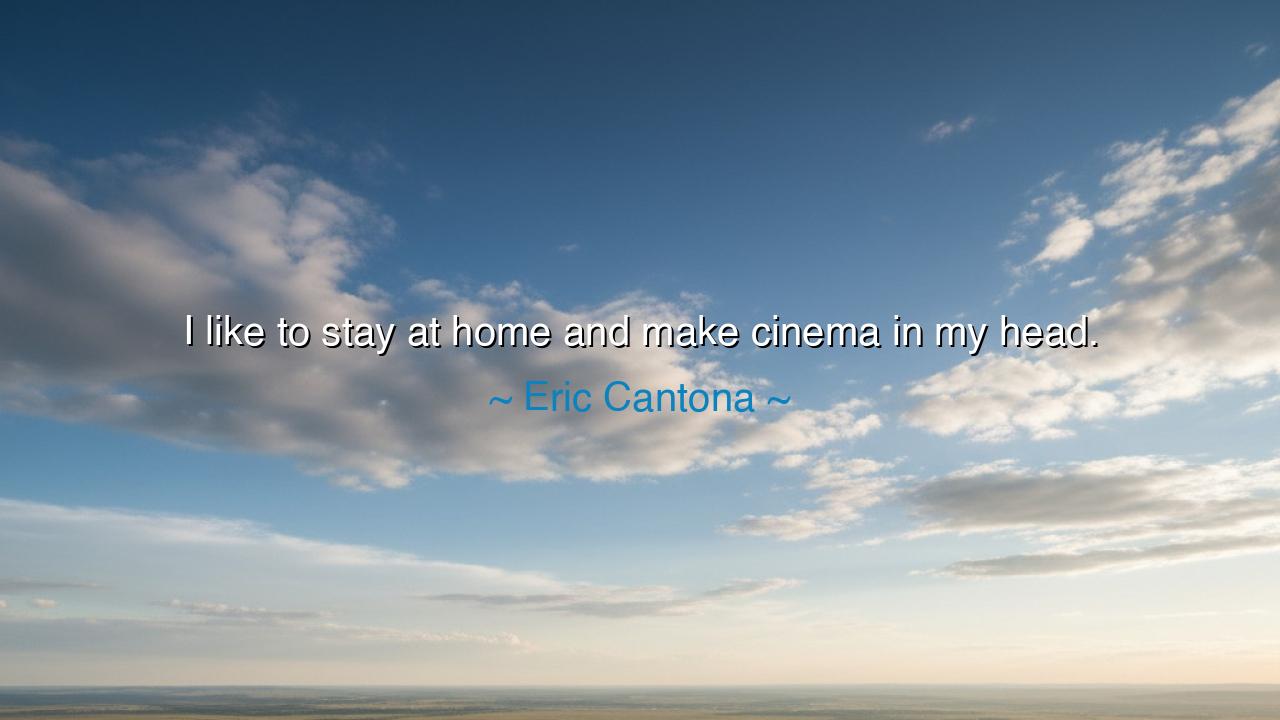
I like to stay at home and make cinema in my head.






When Eric Cantona said, “I like to stay at home and make cinema in my head,” he revealed not just the heart of an artist, but the soul of a philosopher. These words, simple and quiet, are a testament to the power of imagination, that sacred flame that burns even in solitude. Cantona, once a fierce and unpredictable figure on the football field, here speaks with the tenderness of a poet. Beneath the statement lies an eternal truth — that the greatest creations of the human spirit begin not in the world outside, but within the boundless theater of the mind.
The origin of the quote lies in Cantona’s transformation from athlete to artist. Known for his boldness on the pitch and his rebellious nature, he later turned to cinema, poetry, and introspection. His statement reflects this evolution — from a man who once performed before roaring crowds to one who finds peace in the quiet company of his own thoughts. When he says he makes “cinema in his head,” he speaks of the creative vision that lives within all who dare to imagine. It is the ancient truth that solitude, rather than loneliness, is the birthplace of genius.
To the ancients, such inward vision was a divine act. Plato taught that the visible world is but a shadow of the ideas that live in the mind; Leonardo da Vinci spent hours staring at blank walls, seeing within them entire worlds of form and motion. Cantona’s “cinema in the head” is the same sacred practice — the contemplation of the infinite possibilities within the self. The wise have always known that to imagine is to create twice: first in thought, then in being. In that sense, the imagination is both workshop and sanctuary, where one can dream without interruption and build without judgment.
Consider the story of Isaac Newton, who, during the Great Plague of London, retreated to his family home in Woolsthorpe. While the world outside was gripped by fear and death, Newton sat alone beneath an apple tree, pondering the laws of motion and gravity. In his solitude, he saw what no one else had seen — the invisible order of the universe. Like Cantona, he created “cinema in his head” — not of stories, but of the cosmos itself. What he imagined in isolation reshaped human understanding forever. Thus, solitude is not a retreat from life, but an ascent toward clarity.
Cantona’s quote also carries a quiet defiance, a refusal to be enslaved by the noise of modern life. In an age of endless distraction — where screens and voices clamor for attention — to sit still and create inwardly is an act of rebellion. The home, in his words, is not merely a physical space, but a fortress of thought. It is where the soul withdraws from the crowd to rediscover its own rhythm. His “cinema” is the mind’s sanctuary — where ideas unfold, emotions breathe, and truth is born. To dwell in this inner world is to live deeply, while the world outside races by in confusion.
The wisdom here is clear: one must learn to dwell comfortably within one’s own mind. Imagination is not the idle fancy of dreamers; it is the sacred tool by which we shape our future. The ancients built temples and philosophies from such inner visions. Poets found eternity in the echo of their own solitude. In every age, the world has been moved forward not by those who chase noise, but by those who dare to dream in silence. Cantona’s words remind us that creation begins long before the first brushstroke, the first note, or the first word — it begins in the still chamber of the mind, where vision takes root.
Thus, let his words be both comfort and challenge: make cinema in your own head. Retreat, reflect, and imagine boldly. Let the mind become your canvas and your sanctuary. Fill it not with fear or comparison, but with worlds of your own design. For every idea imagined in silence carries within it the seed of greatness. As the ancients taught, and as Cantona affirms in his modern way — the outer world is but the reflection of the inner one. Therefore, guard your imagination, nurture it, and visit it often, for within that private cinema lies the script of your destiny.






AAdministratorAdministrator
Welcome, honored guests. Please leave a comment, we will respond soon